外研版 选修七 Module 3 Literature Dickens'London
- 格式:ppt
- 大小:4.51 MB
- 文档页数:24
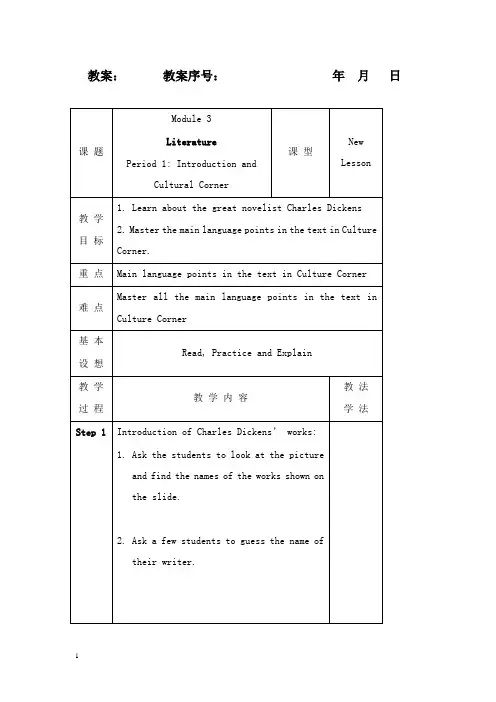
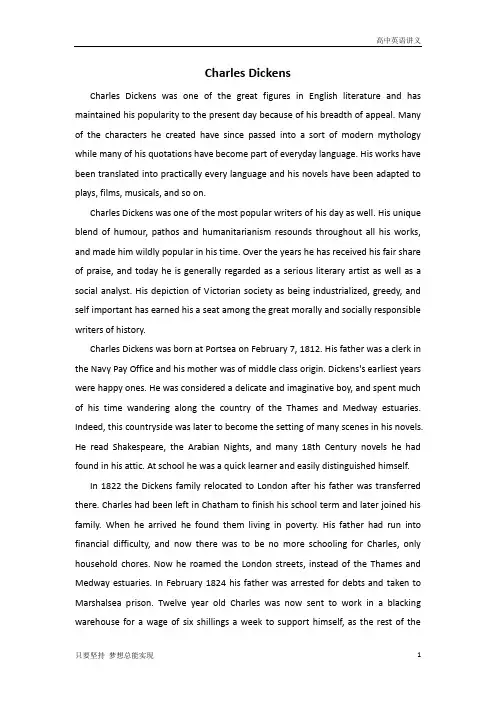
Charles DickensCharles Dickens was one of the great figures in English literature and has maintained his popularity to the present day because of his breadth of appeal. Many of the characters he created have since passed into a sort of modern mythology while many of his quotations have become part of everyday language. His works have been translated into practically every language and his novels have been adapted to plays, films, musicals, and so on.Charles Dickens was one of the most popular writers of his day as well. His unique blend of humour, pathos and humanitarianism resounds throughout all his works, and made him wildly popular in his time. Over the years he has received his fair share of praise, and today he is generally regarded as a serious literary artist as well as a social analyst. His depiction of Victorian society as being industrialized, greedy, and self important has earned his a seat among the great morally and socially responsible writers of history.Charles Dickens was born at Portsea on February 7, 1812. His father was a clerk in the Navy Pay Office and his mother was of middle class origin. Dickens's earliest years were happy ones. He was considered a delicate and imaginative boy, and spent much of his time wandering along the country of the Thames and Medway estuaries. Indeed, this countryside was later to become the setting of many scenes in his novels. He read Shakespeare, the Arabian Nights, and many 18th Century novels he had found in his attic. At school he was a quick learner and easily distinguished himself.In 1822 the Dickens family relocated to London after his father was transferred there. Charles had been left in Chatham to finish his school term and later joined his family. When he arrived he found them living in poverty. His father had run into financial difficulty, and now there was to be no more schooling for Charles, only household chores. Now he roamed the London streets, instead of the Thames and Medway estuaries. In February 1824 his father was arrested for debts and taken to Marshalsea prison. Twelve year old Charles was now sent to work in a blacking warehouse for a wage of six shillings a week to support himself, as the rest of theDickens family had relocated in the Marshalsea. His father was released in May 1824, but let Charles continue working for a few weeks more.It was these months of humiliation and despair that were to have a profound impact on Charles Dickens. It was this experience that provided him with the relentless drive he was known for, and it was this experience that inspired the creation of the suffering children and victims of injustice so often found in his books.Dickens studied for a few more years at Wellington House Academy, and then at age fifteen he became an office boy at the law firm of Ellis and Blackmore. Increasingly dissatisfied with this dull work, he eventually turned to journalism. By 1832 he was general reporter for the True Sun and also parliamentary reporter for his uncle's newspaper, the Mirror of Parliament. He also began writing fictional stories for London magazines. These stories attracted attention and in February 1836 a two volume collection was published named Sketches By Boz.At the same time Dickens's first novel, Pickwick Papers (1836-1837) was being written. This coincided with his marriage to Catherine Hogarth. Catherine bore him ten children in fifteen years, but their relationship eventually deteriorated and they separated in 1858.In the meantime, Pickwick Papers brought Charles Dickens fame. In the next eight years he produced five more novels, miscellaneous stories, and several Christmas books, most notable of which was A Christmas Carol, which was published in 1843 and quickly became one of the world's classics. His many books on various themes earned Dickens a reputation as a social reformer. His public, which he had once made laugh, he now made cry, especially with the death of little Nell in The Old Curiosity Shop. The character of Nell was based on his sister-in-law, Mary Hogarth, who at age seventeen took ill and died in Dickens's arms. This sad memory was to haunt him till the end of his days.By 1849 Dickens had slowed in writing, but was reaching the peak of his creative powers. Between 1849-1850 he wrote his most autobiographical novel, David Copperfield. This was followed by Bleak House (1852-1853), Hard Times (1854), and Little Dorrit (1855-1857). In Little Dorrit there is a fusion of the autobiographical andsocial criticism, as the Marshalsea debtors' prison is displayed as a symbol of England's condition. This was followed by A Tale Of Two Cities (1859) and Great Expectations (1860-1861).These later novels showed a Dickens who was more somber than before. This was partly a result of social disillusionment and partly of personal and domestic circumstances. Despite his literary successes, Dickens was not a happy man. His marriage was falling apart and in the spring of 1859 he and his wife separated. The immediate reason for the breakup was Dickens's growing attraction to the young actress Ellen Lawless Ternan.Charles Dickens spent the last decade of his life in increased personal unhappiness and failing health. He gained no real happiness from his relationship with Ellen Ternan. Moreover, his sons, given all the advantages he lacked, were not turning out as well as he had hoped. One or two of them apparently had inherited their grandfather's attitude towards money and it seemed they were destined for useless lives much in the manner of the early Pip in Great Expectations.From 1858 onward, Dickens spent much of his energy giving a series of public readings from his own works. They were extremely successful, and in 1867, despite poor health, he visited the United States where his performances were a great success as well. He left the United States in April 1868 in irreparably poor health. He continued to push himself, and was halfway through his last novel, The Mystery of Edwin Drood, when he had a stroke and died, at Glad's Hill, on June 9, 1870. He was buried five days later in Westminster Abbey.。
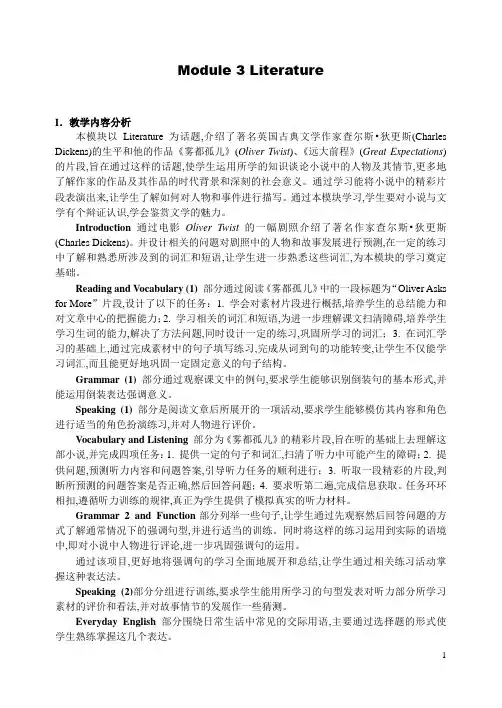
Module 3 LiteratureI.教学内容分析本模块以Literature为话题,介绍了著名英国古典文学作家查尔斯•狄更斯(Charles Dickens)的生平和他的作品《雾都孤儿》(Oliver Twist)、《远大前程》(Great Expectations)的片段,旨在通过这样的话题,使学生运用所学的知识谈论小说中的人物及其情节,更多地了解作家的作品及其作品的时代背景和深刻的社会意义。
通过学习能将小说中的精彩片段表演出来,让学生了解如何对人物和事件进行描写。
通过本模块学习,学生要对小说与文学有个辩证认识,学会鉴赏文学的魅力。
Introduction 通过电影Oliver Twist的一幅剧照介绍了著名作家查尔斯•狄更斯(Charles Dickens)。
并设计相关的问题对剧照中的人物和故事发展进行预测,在一定的练习中了解和熟悉所涉及到的词汇和短语,让学生进一步熟悉这些词汇,为本模块的学习奠定基础。
Reading and Vocabulary (1) 部分通过阅读《雾都孤儿》中的一段标题为“Oliver Asks for More”片段,设计了以下的任务:1. 学会对素材片段进行概括,培养学生的总结能力和对文章中心的把握能力;2. 学习相关的词汇和短语,为进一步理解课文扫清障碍,培养学生学习生词的能力,解决了方法问题,同时设计一定的练习,巩固所学习的词汇;3. 在词汇学习的基础上,通过完成素材中的句子填写练习,完成从词到句的功能转变,让学生不仅能学习词汇,而且能更好地巩固一定固定意义的句子结构。
Grammar (1) 部分通过观察课文中的例句,要求学生能够识别倒装句的基本形式,并能运用倒装表达强调意义。
Speaking (1) 部分是阅读文章后所展开的一项活动,要求学生能够模仿其内容和角色进行适当的角色扮演练习,并对人物进行评价。
Vocabulary and Listening部分为《雾都孤儿》的精彩片段,旨在听的基础上去理解这部小说,并完成四项任务:1. 提供一定的句子和词汇,扫清了听力中可能产生的障碍;2. 提供问题,预测听力内容和问题答案,引导听力任务的顺利进行;3. 听取一段精彩的片段,判断所预测的问题答案是否正确,然后回答问题;4. 要求听第二遍,完成信息获取。

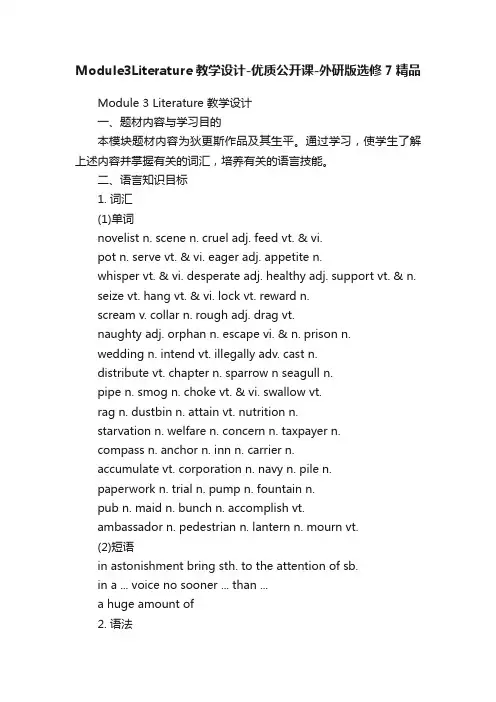
Module3Literature教学设计-优质公开课-外研版选修7精品Module 3 Literature 教学设计一、题材内容与学习目的本模块题材内容为狄更斯作品及其生平。
通过学习,使学生了解上述内容并掌握有关的词汇,培养有关的语言技能。
二、语言知识目标1. 词汇(1)单词novelist n. scene n. cruel adj. feed vt. & vi.pot n. serve vt. & vi. eager adj. appetite n.whisper vt. & vi. desperate adj. healthy adj. support vt. & n.seize vt. hang vt. & vi. lock vt. reward n.scream v. collar n. rough adj. drag vt.naughty adj. orphan n. escape vi. & n. prison n.wedding n. intend vt. illegally adv. cast n.distribute vt. chapter n. sparrow n seagull n.pipe n. smog n. choke vt. & vi. swallow vt.rag n. dustbin n. attain vt. nutrition n.starvation n. welfare n. concern n. taxpayer n.compass n. anchor n. inn n. carrier n.accumulate vt. corporation n. navy n. pile n.paperwork n. trial n. pump n. fountain n.pub n. maid n. bunch n. accomplish vt.ambassador n. pedestrian n. lantern n. mourn vt.(2)短语in astonishment bring sth. to the attention of sb.in a ... voice no sooner ... than ...a huge amount of2. 语法倒装句。
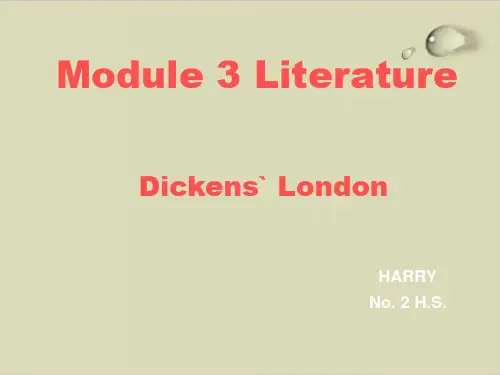
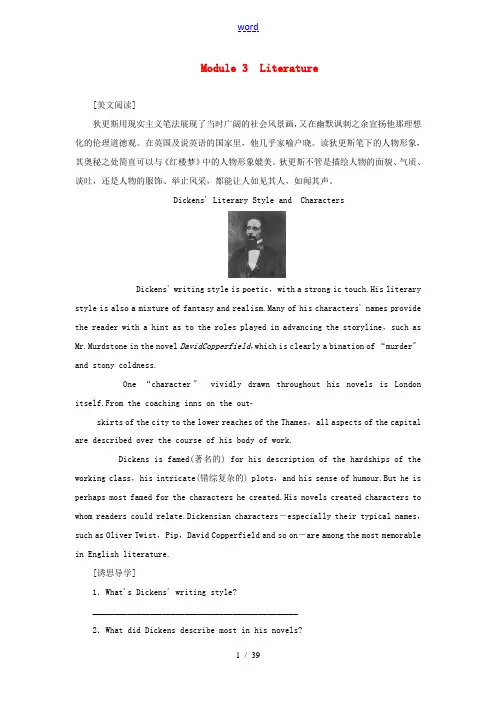
Module 3 Literature[美文阅读]狄更斯用现实主义笔法展现了当时广阔的社会风景画,又在幽默讽刺之余宣扬他那理想化的伦理道德观。
在英国及说英语的国家里,他几乎家喻户晓。
读狄更斯笔下的人物形象,其奥秘之处简直可以与《红楼梦》中的人物形象媲美。
狄更斯不管是描绘人物的面貌、气质、谈吐,还是人物的服饰、举止风采,都能让人如见其人,如闻其声。
Dickens' Literary Style and CharactersDickens' writing style is poetic,with a strong ic touch.His literary style is also a mixture of fantasy and realism.Many of his characters' names provide the reader with a hint as to the roles played in advancing the storyline,such as Mr.Murdstone in the novel DavidCopperfield,which is clearly a bination of “murder〞and stony coldness.One “character〞vividly drawn throughout his novels is London itself.From the coaching inns on the outskirts of the city to the lower reaches of the Thames,all aspects of the capital are described over the course of his body of work.Dickens is famed(著名的) for his description of the hardships of the working class,his intricate(错综复杂的) plots,and his sense of humour.But he is perhaps most famed for the characters he created.His novels created characters to whom readers could relate.Dickensian characters-especially their typical names,such as Oliver Twist,Pip,David Copperfield and so on-are among the most memorable in English literature.[诱思导学]1.What's Dickens' writing style?_______________________________________________2.What did Dickens describe most in his novels?_______________________________________________[答案] 1.Poetic and a mixture of fantasy and realism. 2.The hardships of the working class in old London.Period ⅠPreviewing(教师用书独具)●教学目标本课时主要是学生通过对学案所给出的内容的学习,了解本课文中所出现的词汇,初步了解课文以及相关的背景知识,为下一堂课对课文的全面理解起到一个铺垫作用。
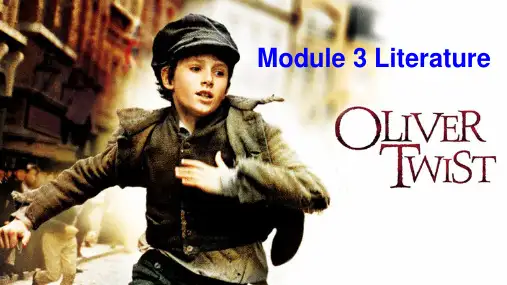
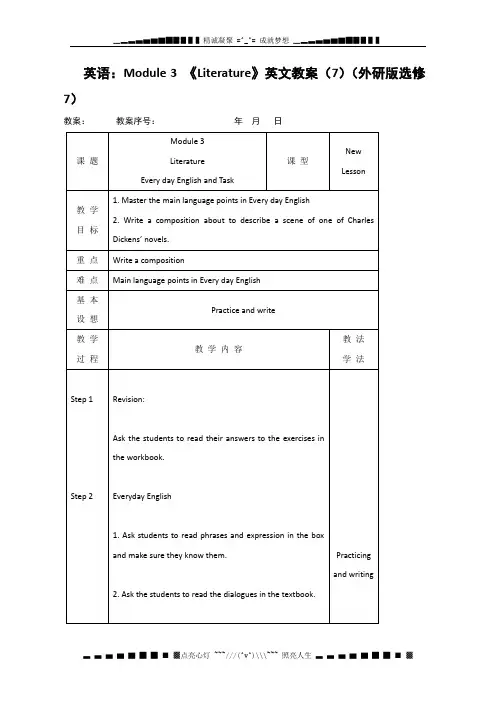
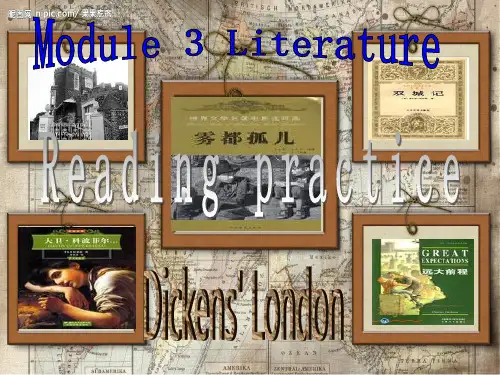
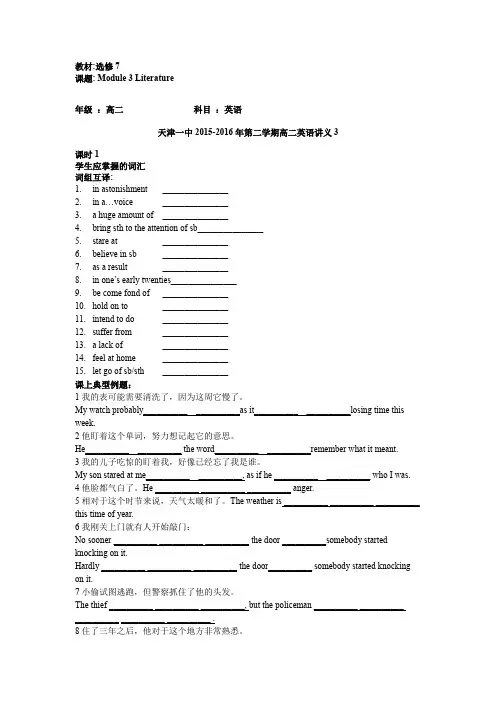
教材:选修7课题: Module 3 Literature年级:高二科目:英语天津一中2015-2016年第二学期高二英语讲义3课时1学生应掌握的词汇词组互译:1.in astonishment _______________2.in a…voice_______________3. a huge amount of _______________4.bring sth to the attention of sb_______________5.stare at _______________6.believe in sb _______________7.as a result _______________8.in one’s early twenties_______________9.be come fond of _______________10.hold on to _______________11.intend to do _______________12.suffer from _______________13. a lack of _______________14.feel at home _______________15.let go of sb/sth _______________课上典型例题:1我的表可能需要清洗了,因为这周它慢了。
My watch probably__________ __________as it__________ __________losing time this week.2他盯着这个单词,努力想记起它的意思。
He__________ __________ the word__________ __________remember what it meant.3我的儿子吃惊的盯着我,好像已经忘了我是谁。
My son stared at me__________ __________, as if he __________ __________ who I was. 4他脸都气白了。
【英语拓展阅读】外研版选修7Module3Literature同步素材2 DickensThe success of Pickwick Papers made Dickens very popular. He suddenly found himself at twenty-four, the most famous novelist of his day. Busy as his social life was, he worked on two novels at the same time—Oliver Twist and Pickwick Papers. He was particularly proud of Pickwick Papers, which was a huge success and was regarded as a great comedy (喜剧的) works. “If I were to live a hundred years and write novels in each, I should never be so proud of any of them as I am of Pickwick Papers.”It has been said that Dickens controlled the imagination of his readers because his imagination controlled himself. The people in his works were so real that they could make him laugh or cry. When writing Oliver Twist he said that he could not rest until Fagin, the wrongdoer (做坏事的人), had been hanged.Dickens was born on February 7, 1812, in Portsmouth and spent most of his childhood in London and Kent, both of which appeared frequently in his novels. After his father was put in prison for debts in 1824, Dickens was forced to support himself by working in a shoe-polish factory. For the most part, he was self-educated. In 1827 he began working as a reporter, perhaps developing the power of precise (精确的) description (描述) that was to make his creative(创造性的) writing so remarkable (引人注目地). Dickens’ marriage to Catherine, with whom he had nine children, ended unhappily in 1858. He started to travel about giving reading of his works. On June 9, 1870, when he was working on a new novel, he died. As he had wished, he said he wanted to die working.。